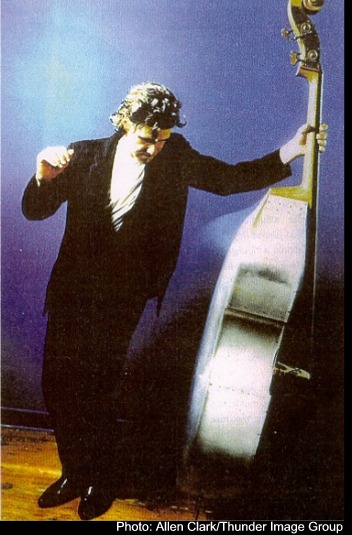
Sideman - Musician Magazine Bassics Magazine Bass Player Crosstalk - Music Connection Bass Notes - Bass Player Magazine Steady Rollin' by Bob Margolin - Blues Review Nightwatch - The Washington Post
Bass Notes - Bass Player Magazine, August 1998
Jeff Sarli - 12 Shades of Blue
By Gregory Isola
"I don't see myself as a session guy," shrugs 39 year-old Jeff Sarli. "I'm no
virtuoso, and I'm not a soloist either - I guess I'm more of a stylist, with a
foundation in American roots music."
Sarli's foundation has served him well. ("I've never played in a Top 40 band in
my life," he laughs.) The busy Annapolis, Maryland, bassist is currently touring
with slide guitarist John Mooney's Bluesiana trio and smart-pop fave Marshall
Crenshaw, and his session log continues to grow. So far, Jeff's tracked dead-on
Delta blues with Mooney, righteous rockabilly with genre pioneer Paul Burlison,
hip-shakin' swing with Big Joe & the Dynaflows, rough 'n' tumble Chicago blues
with ex-Muddy Waters guitarist Bob Margolin and long-time guitar/harmonica team
Anson Funderburg & Sam Myers, convincing country with Commander Cody guitarist
Bill Kirchen, and bona fide rock & roll with a little English band call the
Rolling Stones. He allows, "I end up playing with someone when they've already
heard me and specifically want this thing I do."
"This thing" is an authentic though hardly retro blend of swing rhythms and
Sarli's extensive blues vocabulary. "[Drummer] Big Joe Maher and I are known
for medium-tempo jump blues grooves," he says. "And sure, when we play a
Wynonie Harris tune it's definitely 'correct' enough for the people worried
about that - but most of the time it doesn't sound anything like the original
record. I might throw in some Chicago blues, or even play some electric-funk
parts on the upright - yet we retain the right feel." For proof, check out
the way Jeff drives sections of Big Joe & the Dynaflows' "Oke-She-Moke-She-Pop"
[Layin' in the Alley, Black Top] with seriously pumping eighth-notes, an approach
considered anathema by many swing bassists: "Yeah, I love going from those big
quarter-notes to swinging eighths, especially right when a solo starts. It really
adds tension, and yet the drummer and bass player have to relax and lock in or it
can sound stupid. The key is truly understanding that shuffle beat. Those old
Chicago guys played eighths with so much tension. If you isolate the drummer's
hi-hat, it's actually a really weird groove. It's like he's not thinking in four
but in two: ch-one, ch-two, ch-one, ch-two."
Although Sarli has strong feelings about the right way to record blues upright,
he gives much of the credit for his true-blue tone to his humble '50s Kay. "It just
sounds fabulous in the studio," he grins. The bass, which sports the spray-painted
body of a basic M model and the curly-maple neck and ebony fingerboard of a top-of-the-line S,
has been tweaked ever so slightly to fit Jeff's style. "Since the '50s most acoustic bass necks
have been reset to reduce the tension for steel strings," he explains. "But I dig gut strings
and a stiff action, so when I cut the neck off the broken body of my old S model and put it on
this M body, I had my repair guy put a little more tilt in it, the way they used to do. Now I
use steel for the E and A strings and gut for the D and G, and that extra neck tension really
tightens up the two gut strings. I have a Fishman on it, but this bass has such good volume
and punch, the pickup has less work to do."
Jeff plugs into two Gallien-Krueger 400RB heads and SWR 4x10 and 2x10 cabinets when he's on
the road with the volume-hungry Mooney, but he insists nothing sounds as good as his unplugged
Kay miked in the studio. "When [engineer] Rob Fraboni called me to meet with Keith Richards
about doing the Stones record, the first thing he said was, 'You're bringing that bass, right?'
And I remember right after we finished the first track, 'Flip the Switch' [Bridges to Babylon,
Virgin], Carmine Rojas came up to me in the control room and said, 'Hey, sounds great, man -
what kind of wood is it?' He thought it was some fancy German bass or something. I said,
'Well, umů it's plywood!'"
|

